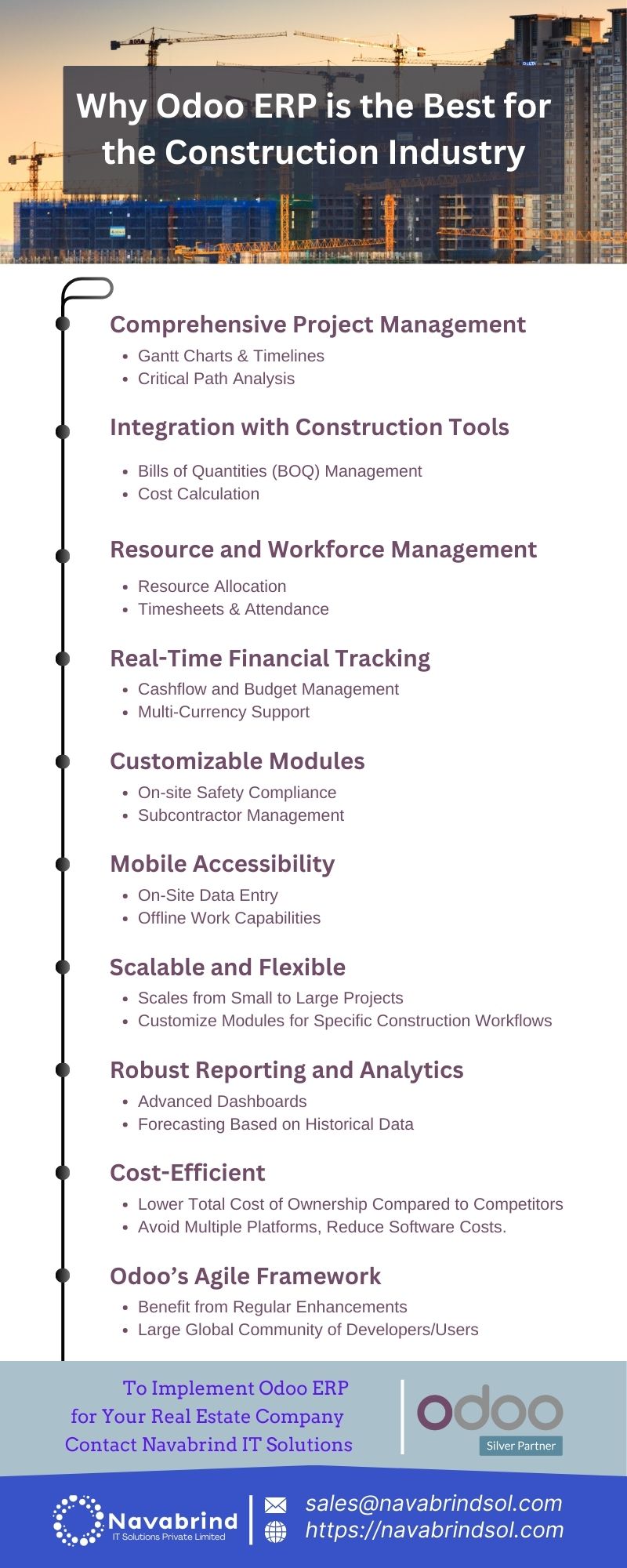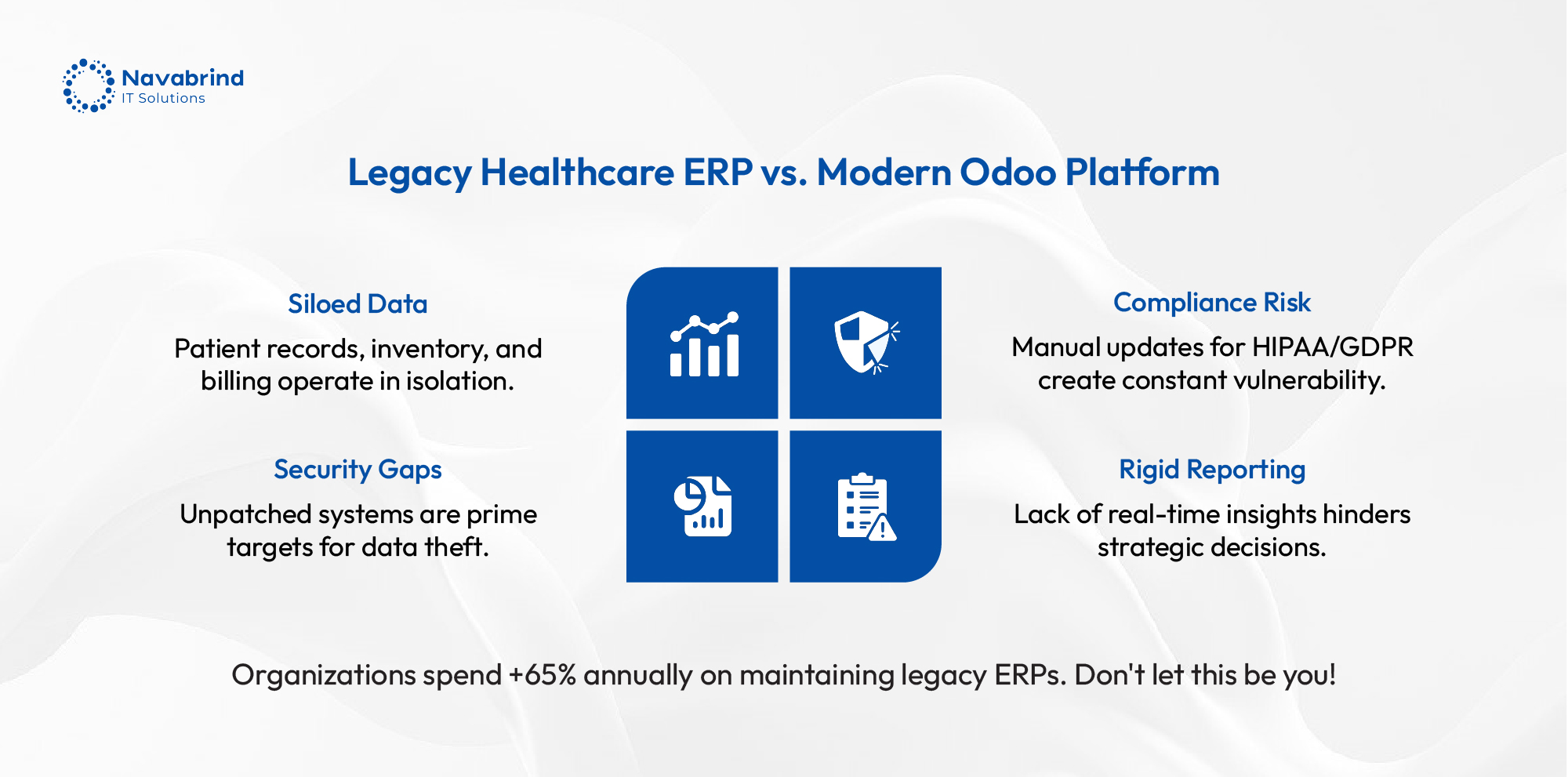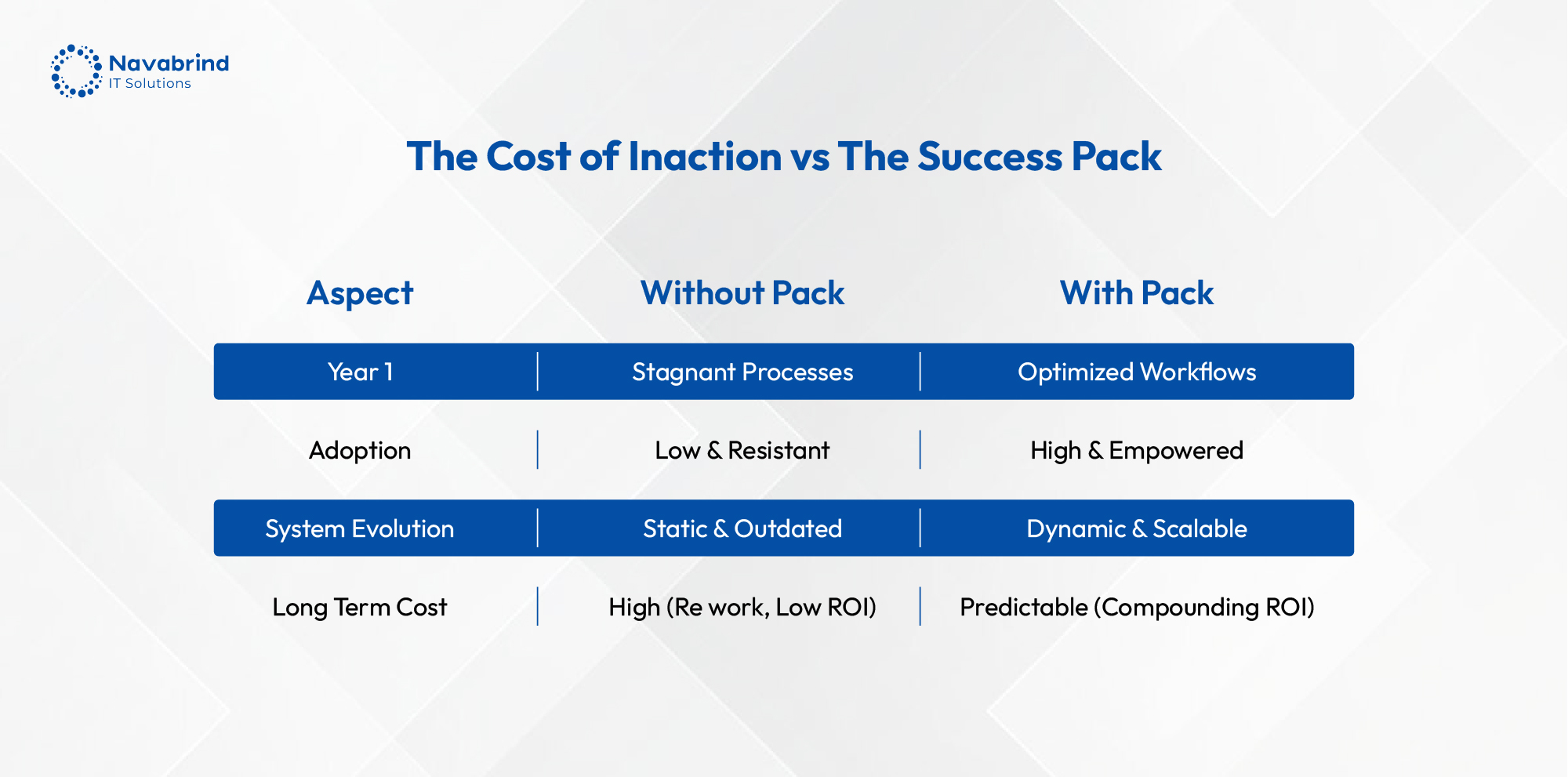Why is Odoo the Best ERP Solution for the Construction Industry?
- September 16, 2024
- Posted by: Tony
- Categories: Blog, Odoo

The construction industry involves multiple stakeholders, intricate workflows, and extensive documentation. Successful project execution requires the integration of various functions, including project planning and scheduling, procurement, inventory, human resources, accounting, risk, communication, and more. This complexity underscores the need for a robust Enterprise Resource Planning (ERP) system to streamline processes, enhance collaboration, and ensure within-budget and on-time project delivery. Among the many ERP solutions available, open-source Odoo is the most comprehensive and flexible option for the real estate industry.
Comprehensive ERP for Construction Management
Odoo’s strength lies in its modular approach, offering over 30 applications that cater to various business needs, including those of the construction industry. The platform provides an all-in-one solution that covers the entire project lifecycle, from initial bidding to project completion and beyond. Key features such as project management, contract management, cost estimation, scheduling, resource allocation, and financial tracking integrate within Odoo’s ecosystem.
- Project Management: Odoo’s project management module allows construction companies to plan, execute, and monitor projects. It enables the creation of detailed project timelines, assigning tasks to team members, and tracking progress in real-time. The Gantt chart and Kanban views offer visual representation of project status, making it easier to identify bottlenecks and adjust plans.
- Procurement and Inventory Management: Managing procurement and inventory is crucial to ensure that materials are available when needed without overstocking. Odoo’s procurement module automates the purchasing process, helping construction companies manage supplier contracts, generate purchase orders, and track deliveries. The inventory management module tracks stock levels in real-time, reduces the risk of material shortages, and ensures smooth project execution.
- Financial Management: Odoo’s accounting module provides a comprehensive suite of tools to manage the financial aspects of construction projects. From budgeting and cost control to billing and payments, Odoo ensures that financial transactions are accurately recorded and accessible. The system also supports multi-currency transactions, making it ideal for companies operating in multiple countries.
- Human Resources: Construction projects usually have a large workforce, including permanent employees, subcontractors, and temporary workers. Odoo’s HR module allows construction companies to manage employee records, track time and attendance, process payroll, and ensure compliance with labor laws. The module facilitates the management of safety protocols and certifications, which are critical in the construction industry.
Key Users of Odoo ERP in the Construction Industry
- Project managers
- Construction managers
- Architects
- Engineers
- Cost estimators
- Contractors and subcontractors
- Procurement managers
- Quality assurance managers
- Project owners
Odoo ERP is the Best for the Construction Industry
Unlike many ERP systems that offer predefined processes, Odoo is flexible and allows users to tailor modules to meet their specific needs. This customization capability is particularly beneficial in the construction industry, where each project may have unique requirements.
For example, construction companies can configure Odoo’s project management module to handle different project types, whether residential buildings, commercial structures, or infrastructure projects. The system can be customized to manage specialized tasks, such as environmental impact assessments, safety audits, and quality control checks.
Odoo’s open-source nature allows for the development of custom modules and integrations with third-party applications. Real estate companies can extend Odoo’s functionality to include industry-specific tools and technologies, such as Building Information Modeling (BIM) software, drone-based surveying systems, and IoT devices for equipment monitoring.
Key Features of Odoo for the Real Estate Industry
Estimating
The Bills of Quantities (BOQs) Management module enables the creation of BOQs, with a cost calculation engine that integrates with supplier databases for real time pricing updates. An embedded historical data analysis tool uses past project data to improve estimation accuracy. The module’s technical details include a robust database schema with tables for items, costs, suppliers, and historical data. Integration with external pricing APIs ensures live cost updates, while a user-friendly interface simplifies BOQ creation and management.
Free-format worksheets allow estimators to build item rates using resources and production calculations, offering flexibility in expressing ideas and calculations. Net rates can be marked by item, trade, page range, or resource type, with separate markups for local and foreign rate components in multi-currency bills. Various standard reports are available, and Report Managers enable the creation of customized presentation-quality and management-specific reports.
Pricing is handled quickly and accurately, with pricing libraries ensuring consistent and well-documented rate build-ups.
Indirect costs are managed in a separate bill within the estimate, leveraging the tools from the Estimating and Planning modules to adjust as the indirect program changes.
Customization and Development
Custom modules in Odoo can be tailored to include construction-specific features such as managing subcontractors, site inspections, and safety compliance. These modules can integrate with third-party systems, including CAD, GIS, and procurement platforms, using APIs and middleware. The development stack for these customizations is Odoo’s framework (built on Python), PostgreSQL for database management, and JavaScript for frontend enhancements. API management is handled through RESTful APIs, allowing integration with external systems.
Cash Flows
The payment process allows for specifying lags on invoice payments to suppliers and subcontractors, along with predicted cost and value escalations. Factors such as interest rates, retention rules, and prepayments can be included to model cash flow. The Net Present Value (NPV) of the contract’s cash flow is generated from weekly cash flow calculations, providing views from client and contractor perspectives, along with weekly cash flow and bank balance results.
The module handles multiple currencies, accepting data from the Estimating module, with flexible exchange rates to analyze the impact of currency fluctuations. The Cash Flow module integrates with BOQs and program data.
Key Features:
- Create manually, from estimate or forecast
- Specify cash flow parameters such as days, weeks, months
- Incorporate payment lags, escalation, interest, NPV, advances, and loans Main and subcontractor retention options
- Multi-currency and exchange rate modeling
- Combine multiple cash flow, financial modeling, and feasibility of projects
- Weekly and monthly forecast
- Cashow analysis and reporting

Subcontract Management
Subcontract management allows for the easy management of multiple subcontractors, maintaining their bills, assigning subcontracts, and other costs. Standard and customizable reports provide users with real-time information and subcontract progress updates for a complete overview of labor resources.
Benefits at a glance
- Subcontracts already set and priced in the Subcontract Adjudication system can be brought directly into the Subcontract Manager including rates from a chosen subcontractor
- Multiple subcontractors can be allocated to a billing item, each with their quantity and rate
- Weekly, bi-weekly and/or monthly payment certificates using company Excel templates
- Upload bill for full integration with BuildSmart procurement to produce subcontractor purchase orders
- Dynamic upload of subcontractor reconciliations for approval and payment processing
Cost and Allowable
Construction cost reporting is an ongoing process with a skill-set requirement that includes accurate forecasting of project performance problems. The construction reporting module offers actual/allowable cost comparison and projected cost and time-to-completion data to produce accurate Earned Value Management (EVM) reporting. With flexible filter parameters to address requirements and customizable document layouts, users can quickly assess and evaluate transparent data for quicker decisions.
Benefits at a glance
- Real time analytics, cost reporting, and dashboarding for effective and powerful decision-making
- Locational and/or activity and/or ledger Cost vs Budget to date
- Locational and/or activity and/or ledger Cost vs Budget to and at completion
- Quickly assess and evaluate the impact of Escalation and Variation Orders
- Comprehensive Earned Value Management and KPI measurement
- Integrates with BuildSmart for actual cost data
Mobile Access
On-site management in the construction industry benefits from mobile applications that enable data entry and access directly from the field. A mobile app also supports field reporting, allowing for site inspections, progress updates, and incident reporting. The technical backbone of this system includes Odoo’s mobile framework or hybrid app development using frameworks like Flutter or React Native. Real-time data synchronization ensures that information on mobile devices is kept in sync with the central database, while offline capabilities allow for local data storage, with automatic syncing upon reconnection.
Planning Module
- Resource Utilization Metrics: Metrics and KPIs measure resource utilization within the Planning module, such as resource allocation rates, utilization percentages, and capacity vs. demand analysis, to help users optimize resource allocation and avoid overallocation or underutilization.
- Scenario Planning: Scenario planning capabilities within the Planning module, allow users to create and compare multiple planning scenarios based on different assumptions, constraints, or what-if scenarios to evaluate potential outcomes and make informed decisions.
- Resource Capacity Planning: Enhancements to resource capacity planning, allows users to better allocate resources across projects and tasks based on availability, skills, and workload.
- Drag-and-Drop Scheduling: Drag-and-drop functionality for scheduling tasks and activities within the Planning module, makes it easier for users to adjust timelines and dependencies.
- Visual Timeline View: A visual timeline view within the Planning module, provides users with a clear and intuitive overview of project timelines, milestones, and deadlines.
- Integration with Calendar: This feature allows users to sync planning activities with their calendar, set reminders, and view tasks and appointments in a unified interface.
- Task Dependencies: Allows users to define and visualize dependencies between tasks, automatically adjust schedules based on dependencies, and identify critical paths in project timelines.
- Collaborative Planning: Enables multiple users and teams to contribute to the planning process, share insights, and collaborate on creating and updating project plans in real time.
Forecasting Module
- Collaborative Forecasting: Enables multiple users or teams to contribute to the forecasting process, share insights, and collaborate on generating more accurate forecasts.
- Forecast Accuracy Metrics: Introduces metrics and KPIs to measure forecast accuracy and performance, such as mean absolute percentage error (MAPE), tracking error, or bias, to help users evaluate the reliability of their forecasts and identify areas for improvement.
- Advanced Forecasting Algorithms: Provide more accurate predictions of future sales, demand, or resource utilization based on historical data and trends.
- Customizable Forecast Models: Customize forecast models tailored to industries, product categories, or business needs, allowing users to tune forecasts to their requirements.
- Integration with External Data Sources: Enables users to import external data sources, such as market trends, economic indicators, or weather forecasts, to improve the accuracy of forecasts.
- Scenario Planning: Enables users to create and compare multiple forecast scenarios based on different assumptions, variables, and business conditions to evaluate potential outcomes and mitigate risks.
- Real-Time Updates: Enhanced real-time updating capabilities for forecasts, enabling users to dynamically adjust forecasts based on changing market conditions, sales trends, or other factors to ensure accuracy and responsiveness.
- Forecast Visualization: Interactive charts, graphs, and heatmaps provide users with a clear and intuitive view of forecasted trends, patterns, and outliers.
Projects Module
- Collaboration Tools: Odoo enhances collaboration features within the Project module, such as integrated communication tools, sharing capabilities, and real-time project updates to facilitate better collaboration among team members.
- Reporting and Analytics: Experience improved reporting and analytics capabilities for projects, with customizable project reports, performance metrics, and dashboards to access insights into project progress and performance.
- Enhanced Project Planning: Offers improvements in project planning capabilities, such as advanced Gantt charts, resource allocation tools, and dependency management features.
- Integrated Task Management: Odoo integrates task management into the Project module, allowing users to create and manage tasks within projects with features like task dependencies, subtasks, and task assignment.
- Time Tracking and Timesheets: Improved time tracking features including better integration with timesheets, automated reminders for time entries, and option to track time spent on specific tasks or projects more accurately.
- Project Templates: Ability to create project templates, allowing users to quickly set up new projects based on predefined templates, with preconfigured tasks, deadlines, and resources.
- Cost Management: Budget tracking, expense tracking, and cost estimation tools help users manage project finances effectively.
- Mobile Accessibility: Users can access and manage projects on the go using the Odoo mobile app, with features optimized for mobile devices.
Budgeting Module
- Integration with Accounting: Users can synchronize budget data with actual financial transactions, generate budget vs. actual reports, and reconcile budgetary accounts in real-time.
- Budget Approval Workows: Users can set customizable approval processes, delegate authority, and track the status of budget approvals across different levels of the organization.
- Forecast Integration: Incorporate forecasted revenues, expenses, or cash flows into budget planning processes to improve the accuracy and reliability of budgets.
- Flexible Budget Creation: Create flexible budget structures, accommodate different budgeting methodologies, such as zero-based budgeting, incremental budgeting, or activity-based budgeting.
- Multi-Year Budgeting: Users can plan and track budgets over multiple years and compare actual performance against long-term financial goals.
- Budget Versions: Features for managing multiple versions of budgets, enabling users to create, compare, and revise budget scenarios, such as baseline budgets, revised budgets, or what-if budgets, to facilitate better decision-making and forecasting.
- Budget Allocation: Features, allowing users to allocate budget amounts to specific cost centers, departments, projects, or activities, and track expenditures against allocated budgets in real-time.
- Budget Monitoring and Control: Receive alerts, notifications, and automated workflows to notify users of budget variances, deviations from targets, or overspending.
- Budget Reporting and Analytics: Users can access customizable budget reports, variance analysis tools, and performance metrics to evaluate budget performance and identify areas for improvement.
Better Than Competitors: Odoo vs. MS Project, Primavera P6 EPPM, and RIB Candy
While several ERP solutions are available for the construction industry, including MS Project, Primavera P6 Enterprise Project Portfolio Management from Oracle, and RIBCandy, Odoo offers distinct advantages that make it the superior choice.
- MS Project: MS Project is a robust project management tool, but is limited to scheduling and task management. It lacks the comprehensive functionality of an ERP system. Odoo, provides an all-encompassing solution that covers all aspects of construction management, reducing the need for multiple software applications.
- Primavera PC EPPM: Primavera is a powerful project management tool for large projects. However, it is focused on scheduling and resource management. Primavera lacks integration with other business functions that Odoo offers. Construction companies using Primavera need to rely on additional software for accounting, procurement, and HR, leading to fragmented workflows and data silos.
- RIB Candy: RIB Candy is a specialized software for construction cost estimation and project control but does not offer the breadth of functionality required for complete project management. Odoo’s comprehensive suite of tools make it a versatile solution for all aspects of construction projects, including cost estimation, scheduling, procurement, and financial management.
A Future-Proof Solution
The construction industry is evolving rapidly, with new technologies and methodologies emerging regularly. To stay competitive, real estate companies need an ERP system that can adapt to changing business needs. Odoo’s open-source nature ensures that the platform can evolve along with the industry, with continuous updates and improvements being released by the developer community.
Odoo’s modular architecture allows construction companies to start with the basic modules they need and expand the system as their requirements grow. This scalability ensures that Odoo remains a viable solution for both small construction firms and large enterprises.
Having the right ERP system can make the difference between project success and failure. Odoo’s comprehensive coverage, flexibility, and integration capabilities make it the best ERP solution for the construction industry. By choosing Odoo, construction companies can streamline their operations, enhance collaboration, and ensure that projects are completed on time and within budget, all while having the flexibility to adapt to future challenges.
If your real estate company needs to implement Odoo ERP or wants to understand how Odoo ERP can help, reach out to Navabrind IT Solutions. We are an Odoo Gold Partner and have been implementing Odoo for over a decade.
Schedule a conversation with us now!
Related Articles
-
Post
From Legacy Healthcare ERP to Odoo ERP: Why You Need Expert Odoo Migration Help
From Legacy Healthcare ERP to Odoo ERP: Why You Need Expert Odoo Migration Help February 11, 2026 Posted by: Tony Category: Uncategorized No Comments Why Healthcare Organizations Need Odoo ERP Migration Legacy healthcare ERP systems create barriers to efficiency. They are expensive to maintain, and struggle to integrate tools. This disconnect impacts patient care coordination, -
Post
From LLMs to Agentic AI: A Practical Guide to What They Mean and How to Choose
From LLMs to Agentic AI: A Practical Guide to What They Mean and How to Choose February 4, 2026 Posted by: Tony Categories: Artificial Intelligence, Blog No Comments As definitions, use cases, expectations, and investments around Large Language Models (LLMs), Retrieval-Augmented Generation (RAG), AI agents, and agentic AI continue to expand, many individuals and organizations -
Post
Beyond Go-Live: How Your Odoo Success Pack Drives Real, Long-Term ROI
Beyond Go-Live: How Your Odoo Success Pack Drives Real, Long-Term ROI February 3, 2026 Posted by: Category: Uncategorized No Comments The Implementation Myth Businesses mistakenly measure ERP success by completing the implementation phase while the actual measure of value is the operational transformation unlocked after go-live. The Odoo Success Pack is the framework engineered to
How can we help you?
Get in touch with a solutions consultant that can share best practices and help solve specific challenges.








